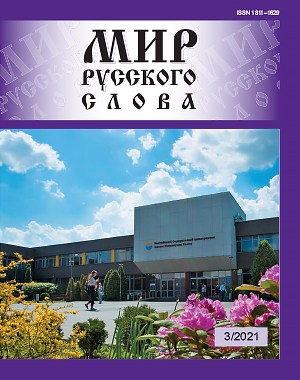Internet Texts with a Native Advertising Component in Different Discourses: Linguistic Features and the Possibility of Using in Russian as a Foreign Language Teaching
DOI:
https://doi.org/10.24412/1811-1629-2021-3-92-102Abstract
The article is devoted to the functioning of native advertising in the actual advertising, scientific and legal discourses. The authors explore contact-establishing intentions in various speech genres, where advertising information is embedded. The object of advertising, the author's modality and the image of the reader are analyzed as constructive dominants of the language composition of native advertising text. In addition, the authors pay attention to the motivational orientation and information saturation of the text, its stylistic, compositional and structural components. An attempt is made to identify new formats of native integration in scientific and legal discourses, since the usual formats and boundaries of natural advertising do not fit into the formalized structure of scientific and legal texts. Examples of non-standard formats are open access to full-text scientific publications, educational portals and electronic resources, an invitation to become a member of the author's team, the project as a form of scientific knowledge, the presence of a logo and a company name, telephone numbers for communication, a recommendation to the addressee to make a repost in social networks, changing communication registers to demonstrate examples from judicial practice, etc. It has been found that the discursive space directly affects the format and boundaries of advertising content, and advertising scripts in this case are acting as discursive elements. The article also presents a linguodidactic interpretation of fragments with native advertising. The work model is built around the identification of advertising integration, the establishment of its intentions and semantic forms, which makes possible the systematical holistic understanding of the text. At the same time, such work is aimed at developing the skills to think, evaluate and interpret the information received, which is necessary for the formation of communicative competence in the professional sphere of communication. Besides, the analysis of native content acquaints future foreign marketers, historians, linguists and lawyers with working tools, offers modern and at the same time useful sources for self-education.
Keywords:
native advertising, native advertising formats, Internet texts, advertising discourse, scientific discourse, legal discourse, teaching Russian as a foreign language
Downloads
References
Литература
References
Downloads
Published
How to Cite
Issue
Section
License
Articles of "The World of Russian Word" are open access distributed under the terms of the License Agreement with Saint Petersburg State University, which permits to the authors unrestricted distribution and self-archiving free of charge.




